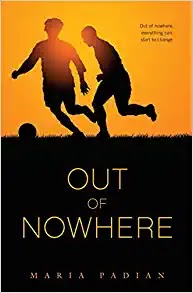Maria Padian is the author of the new young adult novel How to Build a Heart. Her other books include Wrecked and Out of Nowhere. She lives in Brunswick, Maine.
Q: You write that How to Build a Heart emerged in part from
your own family stories. How did you create your character Izzy?
A: Like Izzy, I’m the daughter of two cultures: my Latina
mother’s and my Irish father’s. Growing up, our lives were animated by a
variety of accents, stories and traditions, not to mention unusual food
pairings: a dinner of arroz con pollo followed by buttery Irish soda bread was
not unheard of! While that was all wonderful, it also left me adrift … like
Izzy.
I look nothing like my father; I struggle to speak my
mother’s first language, Spanish. Growing up sometimes felt like having a guest
pass to a club I couldn’t join.
I had a constant yearning to belong but never quite felt
that I did. And whenever I attempted to embrace certain aspects of one identity
or another, I felt like … a fraud. I leaned into those feelings to create Izzy.
Q: Did you know how the novel would end before you started
writing it, or did you make many changes along the way?
A: I always know how one of my novels will end! I just have
no idea how I’ll get there.
Some famous writer compared writing to driving on a foggy
night with the lights on: you can only see a few feet ahead, but if you keep
moving forward, adding words as if they were miles, you’ll eventually reach
your destination.
I like that, but would add one caveat: along the way, pick
up hitchhikers. These are supposedly minor secondary characters who, if you let
them in and follow their directions, will take the story along an unexpected
route.
Every single one of my novels has a hitchhiker. Every. One.
And each of those hitchhikers helped me wade through the murky middle and reach
my destination.
I won’t reveal who that was in How To Build a Heart but I
have asked teens to get back to me after they’ve read the book and see if they
can guess!
Q: The novel deals with issues of race and wealth. Why did
you decide to include those topics in the book, and what do you hope readers
take away from the story?
A: I was a news reporter for years, so I think I’m naturally
drawn to topical themes in my novels. But issues surrounding race and wealth
are not merely “topics” to me.
There’s a scene in How To Build a Heart - where Izzy is
wondering why the Shackeltons put up with racist neighbors - that came right
from MY heart. Izzy compares prejudice to smoke, to a smell. A stench.
And she realizes that from their position of privilege -
upwind - Aubrey and Sam aren’t affected by it the way she is from her position
“downwind.”
Unless you’ve been on the receiving end of those macro and
micro aggressions that result from prejudice, you can’t know. My hope is that
readers gain a little empathy and perhaps see others and see their peers in a
new way after reading this book.
Q: How was the book's title chosen, and what does it signify
for you?
A: I had my “working” title for this book, followed by my
“submission” title, followed by the final title my editor and I cooked up
together!
We love it: it weaves together the romance, the Habitat for
Humanity project, and ultimately the biggest theme of the book, which is that
family/identity/home are not accidents of fate or birth. They are all things we
build.
Q: What are you working on now?
A: Ohhhh … I’m flailing creatively right now. I was three
chapters into a new book which might need to be put on hold for the time being.
I’m on fire about a completely new set of characters, but they’re a bit of a
departure for me. And I’m also peeking into another world which is more
predictable, more in my wheelhouse.
At some point I’ll settle into one of these and start
writing for real, but at the moment I’m messing around.
Q: Anything else we should know?
A: I don’t really like to write. I like to READ. I love
stories, I believe in the power of stories to bring people together, to change
hearts and minds. That’s why I make myself sit down and WRITE. Because then
stories happen, and stories are good things.
--Interview with Deborah Kalb




No comments:
Post a Comment